
11+ School Counselor Lesson Plan Templates in PDF | Word
Empowering the youth to become the best can be such a fulfilling task to accomplish. But, school counselors proved that…
Mar 23, 2021
One of the key responsibilities of a school is to provide a safe and secure learning environment for all students. The term environment in this context refers to a well-disciplined environment including controlled and orderly surroundings for the students to enhance their learning. The school discipline plan lays out certain policies regarding the disciplinary principles that must be followed by the whole school.

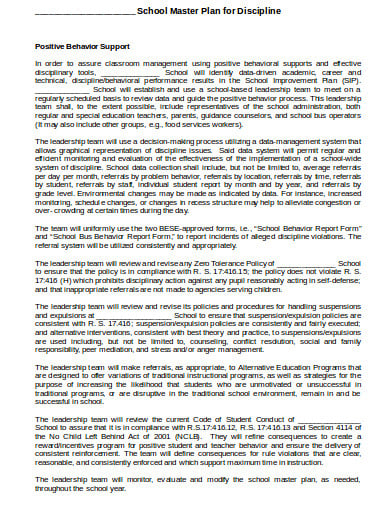 louisianabelieves.com
louisianabelieves.com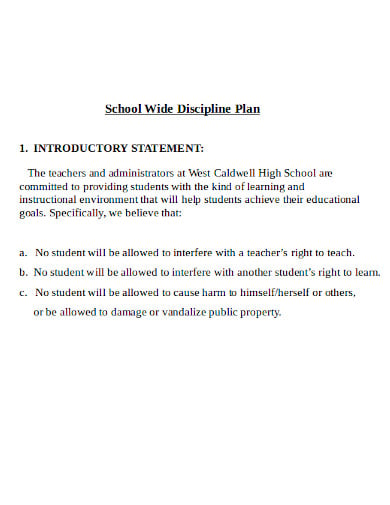 caldwellschools.com
caldwellschools.com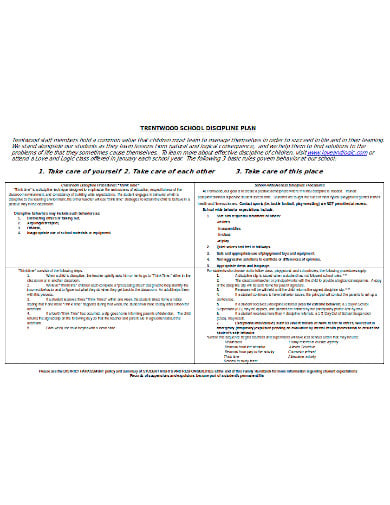 evhs.net
evhs.net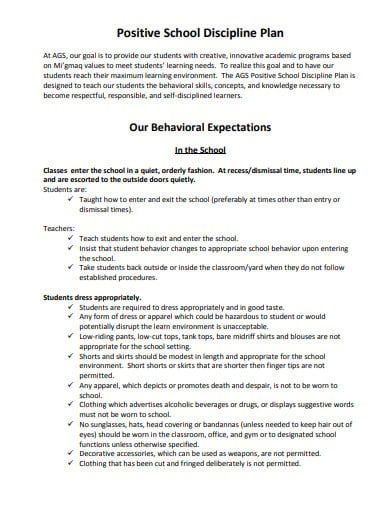 listuguj.ca
listuguj.ca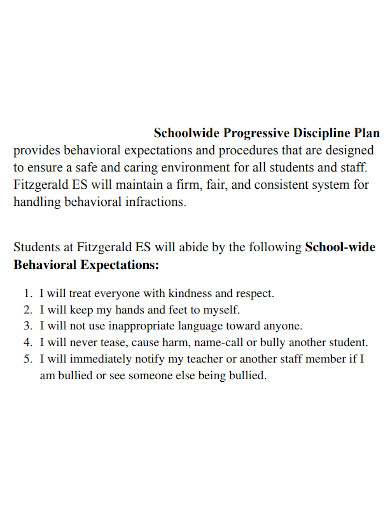 fitzgeraldelementary.org
fitzgeraldelementary.org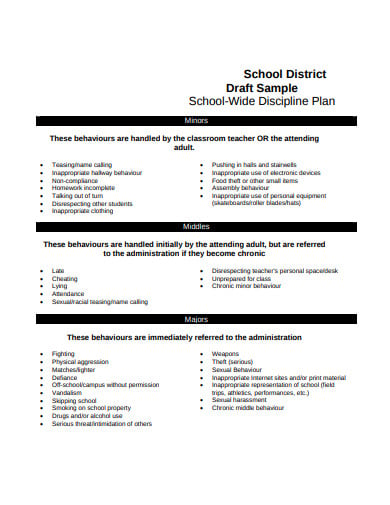 gov.nl.ca
gov.nl.ca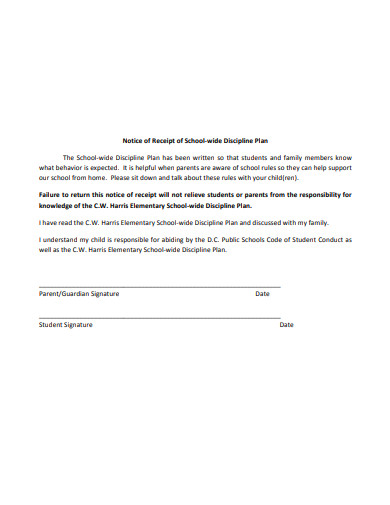 cwharriselementary.org
cwharriselementary.org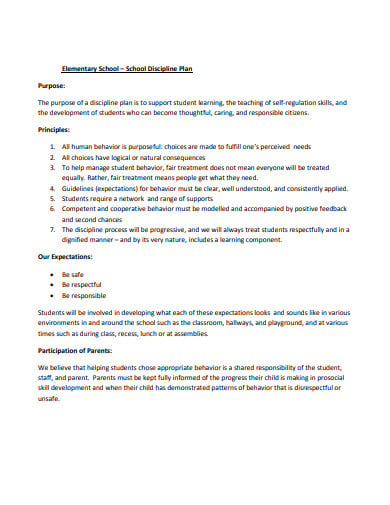 tak.yukonschools.ca
tak.yukonschools.ca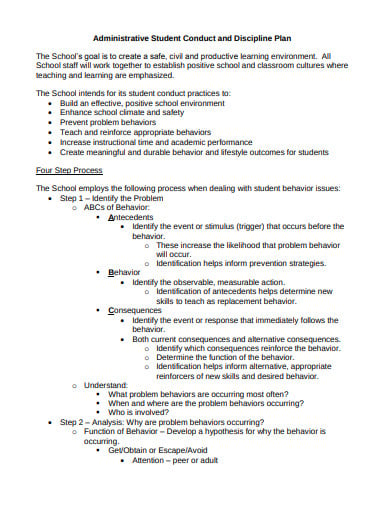 wasatchpeak.org
wasatchpeak.org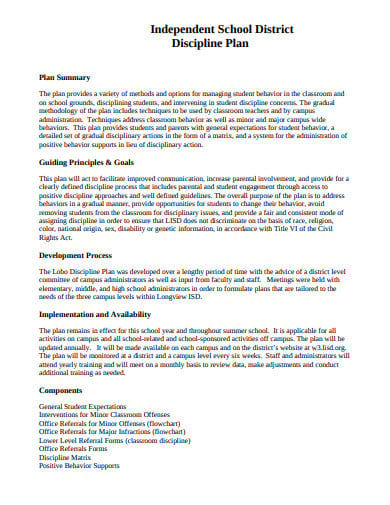 lisd.org
lisd.org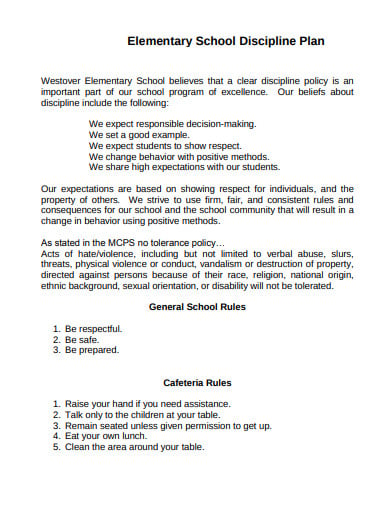 montgomeryschoolsmd.org
montgomeryschoolsmd.orgIf you are a principal, you need to let the teachers of your school know what your expectations are and especially regarding classroom management and student discipline. The teachers should know what kinds of discipline issues you expect them to handle in classes and what issues you would expect them to send to you. Layout the consequences that are acceptable for them to hand out when they are dealing with primary level student discipline problems. Make a definite plan that should be in place for how a major discipline issue that may occur in the classroom should be handled.
The teachers working in your school must feel that you as the principal have their back when they send you a discipline referral form. You must establish trust with teachers that will enable better communication so that you can provide constructive criticism when it becomes necessary. This is because some teachers may abuse the disciplinary policies.
As a principal or an administrator, you cannot expect every student, parent or teacher to like you. The key is to earn respect as it will help you go a long way in being a strong and fair leader. Make sure that you prove to be both consistent and fair while making your discipline decisions.
Make sure that you document the major issues that arise throughout the discipline process. This documentation may include information such as the student’s name, the reason for referring to the principal’s office, the referring teacher’s name, and what are the actions that were taken. It starts protecting you as well as the teachers that are involved in case any legal actions are taken. Documenting also helps you in noticing certain patterns and makes you realize the various disciplinary problems. It will make things easier for you to make changes and adjustments for making some corrections.
It is important to follow your school district’s policies and procedures and never act outside of the guidelines. You must follow these state laws as they are there to protect you, but you may also lose your job if you do not adhere to them. Make sure that you check the state laws in cases that may involve issues such as suspension or search and seizure.
When a teacher or a school organization may take some actions for a student or a group of students in case his/her behavior starts disturbing any ongoing educational activity, this is related to school discipline. The school discipline may also get disturbed if the student’s disorderly behavior breaks a rule created by the teacher or the whole school system. Proper discipline can help in guiding the children’s behavior or set certain limits to help them learn how to take care of themselves along with the other people around them.
The school systems are responsible for setting up rules, and they will be subject to discipline in case they break these rules. These rules may define the expected standards of clothing, punctuality, work ethics or social conduct. In general, the term discipline refers to the punishment that is the outcome of breaking the rules. The goal of discipline is to set limits or restrictions regarding certain behaviors or attitudes that may be seen as harmful or against the school policies.
The school discipline plan mainly carries out a set of actions that are determined by the school district to rectify certain actions that are taken by a student that is considered inappropriate. There can be many reasons why students misbehave in school and even scholars have started exploring reasons why students are being disciplined. Some of the reasons why it is important are as follows:
There are instances when the students are curious and constantly searching for some meaning and stimulation in the school environment. The curiosities or needs for the authentic intellectual stimulation of the students may not get satisfied if the classes are too one-dimensional or fail to involve students sufficiently and are too challenging, etc. This makes them look for satisfaction in breaking the rules or taking up some other inappropriate behavior.
Some students, especially the older ones are not much satisfied with the disciplinary rules that are set for them. Too many restrictions also lead the students to sort to disorderly behavior and resort to breaking rules as they may just be frustrated to feel too caged due to the definition of disciplined behavior set before them.
In some situations, some students fail to receive the attention that they crave and mostly fine other ways to get it even it means breaking the rules and drawing negative attention. Therefore, the teachers should let their students know how much they care about them and value their work to make them respect a teacher’s request and other rules of the school.
Disproportionate punishment can sometimes backfire as it may turn a student to be more aggressive and even create a feeling of anger inside them which may affect them emotionally. The teachers must make sure that they are not biased towards their students nor use any kind of excessive punishment on the students.

Empowering the youth to become the best can be such a fulfilling task to accomplish. But, school counselors proved that…

A compensation plan is the detailed plan of an employee’s wages, salaries, benefits and the terms of payment. The plan…

As there is a saying that ” with big positions comes the big responsibilities”. It is the huge duty to…

The student recruitment plan is one of the most important and essential parts of educational institutions. The strategy interacts with…

The recruitment and retention are two different terms explaining the thing that is inter-related. Recruitment is the process of identifying,…

A College Recruitment Plan is the designed plan or a strategy that is developed to recruit the employees of a…

A Recruitment Action Plan is a strategy that is designed for putting the recruiting process into action. This is the…

A recruitment business plan is one of the necessities for a company. It does not just help you to map…

Clinical trial recruitments are considered to be very essential to the success of any clinical study and it is often…